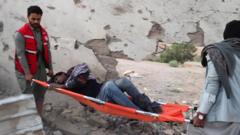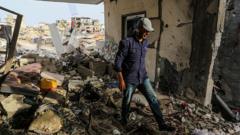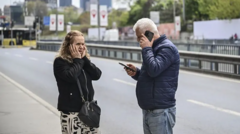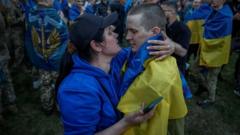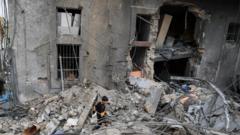The ongoing conflict between Turkey and the PKK has severely affected communities in Iraqi Kurdistan, particularly in villages like Sergele, which are increasingly surrounded by Turkish military bases. As local farmers struggle to maintain their livelihoods and deal with violence, tensions rise amid forced displacements and unacknowledged civilian casualties.**
"Inside Iraq's 'Forbidden Zone': The Struggles of Local Communities under Turkish Military Control"**
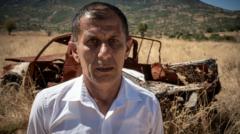
"Inside Iraq's 'Forbidden Zone': The Struggles of Local Communities under Turkish Military Control"**
A look into the impact of Turkey's military presence on Iraqi Kurdistan's residents, revealing the hardships faced by villagers living near the border.**
In the mountainous region of Iraqi Kurdistan lies the village of Sergele, where for decades, families cultivated pomegranates, almonds, and peaches. However, their way of life faces unprecedented disruption as Turkish military bases encircle their lands—several newly constructed in just two years, including one near a vital water supply. Sherwan Sergeli, a local farmer, has lost access to parts of his fields, lamenting the occupation of Kurdish territory.
Sergele's situation is reflective of what locals term the "Forbidden Zone." This region, stretching nearly the full length of the Iraq-Turkey border, has become a battleground between Turkish forces and the Kurdistan Workers' Party (PKK), a Kurdish militant group that has been waging an insurgency against Turkey since 1984. Reports indicate a dramatic rise in civilian casualties from drone strikes in this zone, with thousands displaced from their ancestral lands.
The recent expansion of Turkey's military operations is shocking; investigative reporting reveals at least 136 military installations have been established in northern Iraq, covering over 2,000 square kilometers. This surge, largely initiated since 2018, has led to considerable deforestation as new roads and facilities are built to sustain Turkey's operations against the PKK.
Locals like Salam Saeed express fears for their livelihoods and autonomy. Saeed hasn't been able to tend to his vineyard for three years due to a nearby military base, and he believes Turkey's actions are aimed at seizing this territory. The atmosphere is tense, with reports of Kurdish border guards being pushed back into Iraqi territory by Turkish forces.
While Iraq’s government publicly condemns Turkey's military actions, internal political realities complicate their response. Iraq's reliance on Turkey for trade and water security has resulted in a complicated relationship, as evidenced by a lack of tough measures against Turkish forces despite signed agreements that allow military collaboration against the PKK.
The conflict's toll is palpable, as exemplified by tragic stories of civilian casualties. Families like that of 24-year-old Alan Ismail, killed by what is believed to be Turkish aerial bombardment, face further anguish when Kurdish authorities dismiss or obscure accountability for such events. Local victims often find it almost impossible to seek justice or compensation, as many documents fail to recognize the violent context of their deaths.
As this complex situation unfolds, the civilian population in Iraqi Kurdistan finds itself caught in a perilous cycle of violence, displacement, and a desperate quest for recognition amidst ongoing military operations. Local leaders downplay the ramifications on civilians while fostering relationships with Turkey, leaving villagers to bear the brunt of this hidden war.
Sergele's situation is reflective of what locals term the "Forbidden Zone." This region, stretching nearly the full length of the Iraq-Turkey border, has become a battleground between Turkish forces and the Kurdistan Workers' Party (PKK), a Kurdish militant group that has been waging an insurgency against Turkey since 1984. Reports indicate a dramatic rise in civilian casualties from drone strikes in this zone, with thousands displaced from their ancestral lands.
The recent expansion of Turkey's military operations is shocking; investigative reporting reveals at least 136 military installations have been established in northern Iraq, covering over 2,000 square kilometers. This surge, largely initiated since 2018, has led to considerable deforestation as new roads and facilities are built to sustain Turkey's operations against the PKK.
Locals like Salam Saeed express fears for their livelihoods and autonomy. Saeed hasn't been able to tend to his vineyard for three years due to a nearby military base, and he believes Turkey's actions are aimed at seizing this territory. The atmosphere is tense, with reports of Kurdish border guards being pushed back into Iraqi territory by Turkish forces.
While Iraq’s government publicly condemns Turkey's military actions, internal political realities complicate their response. Iraq's reliance on Turkey for trade and water security has resulted in a complicated relationship, as evidenced by a lack of tough measures against Turkish forces despite signed agreements that allow military collaboration against the PKK.
The conflict's toll is palpable, as exemplified by tragic stories of civilian casualties. Families like that of 24-year-old Alan Ismail, killed by what is believed to be Turkish aerial bombardment, face further anguish when Kurdish authorities dismiss or obscure accountability for such events. Local victims often find it almost impossible to seek justice or compensation, as many documents fail to recognize the violent context of their deaths.
As this complex situation unfolds, the civilian population in Iraqi Kurdistan finds itself caught in a perilous cycle of violence, displacement, and a desperate quest for recognition amidst ongoing military operations. Local leaders downplay the ramifications on civilians while fostering relationships with Turkey, leaving villagers to bear the brunt of this hidden war.

